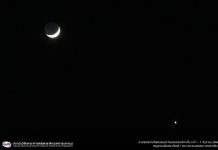Barcelona, Spain (AP) — The group behind a $1.4 billion telescope planned for Hawaii is applying for a permit to build in Spain as ongoing protests and a human blockade prevent them from starting construction on Mauna Kea, Hawaii’s highest peak that some people consider sacred.
The plan to start construction of the Thirty Meter Telescope on the Big Island has been thwarted by a group of Native Hawaiian activists who say the construction will further desecrate a mountain that already has more than a dozen observatories.
Thirty Meter Telescope Executive Director Ed Stone said in a statement that the group still wants to break ground on Mauna Kea, but they need to have a backup plan.
“We continue to follow the process to allow for TMT to be constructed at the ‘plan B’ site in (Spain) should it not be possible to build in Hawaii,” Stone said. “Mauna Kea remains the preferred site.”
Protest leaders, who say they are not against science or astronomy, said the Spain permit is a positive development, but it’s not enough for them to end their blockade of Mauna Kea’s access road, where more than 2,000 people have gathered at times.
“There’s lots of good science to be done from the Canary Islands,” said Kealoha Pisciotta, who has helped organize the protest on Mauna Kea. It would “be a win for everyone.”
But she said there is no trust between the activists, who call themselves protectors of the mountain, and telescope officials.
Scientists selected Mauna Kea’s summit for the giant telescope because the weather and air conditions there are among the best in the world for viewing the skies. The telescope would give researchers a view back to the deepest reaches of our universe and allow them to examine the time immediately following the Big Bang.
Once built, scientists are expected to use the telescope to explore fundamental questions about the universe , including whether there’s life outside our solar system and how stars and galaxies formed. The large size of the telescope’s mirror means it would collect more light, allowing it to see faint, far-away objects such as stars and galaxies.
Spain’s science minister, Pedro Duque, has reiterated the government’s full support for the Canary Islands as a Plan B site for the telescope and said the country is well-prepared to host it.
“We have all the necessary plans at all levels — the people, the speed, the systems, absolutely everything is ready if they want to come,” Duque said.
The Canary Islands archipelago, located west of Morocco in the eastern Atlantic Ocean, is already home to several powerful telescopes. The Roque de los Muchachos Observatory hosts more than 20.
 |
 |
 |





